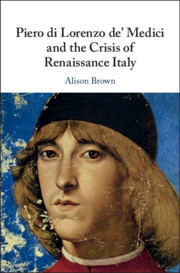Book contents
- Piero di Lorenzo de’ Medici and the Crisis of Renaissance Italy
- Piero di Lorenzo de’ Medici and the Crisis of Renaissance Italy
- Copyright page
- Dedication
- Contents
- Acknowledgements
- List of Abbreviations
- Introduction
- Part I The Early Years
- Part II Between Republicanism and Princely Rule
- Part III Piero in Power
- 10 Lorenzo’s Death and Its Aftermath, 1492
- 11 Balancing Power in Italy, 1493
- 12 ‘The Viper with Its Tail in Florence’, 1493–1494
- 13 The Crux, 1494
- 14 The French Descent
- 15 Revolution in Florence
- Part IV Piero in Exile
- Conclusion
- Bibliography
- Index
11 - Balancing Power in Italy, 1493
from Part III - Piero in Power
Published online by Cambridge University Press: 20 December 2019
- Piero di Lorenzo de’ Medici and the Crisis of Renaissance Italy
- Piero di Lorenzo de’ Medici and the Crisis of Renaissance Italy
- Copyright page
- Dedication
- Contents
- Acknowledgements
- List of Abbreviations
- Introduction
- Part I The Early Years
- Part II Between Republicanism and Princely Rule
- Part III Piero in Power
- 10 Lorenzo’s Death and Its Aftermath, 1492
- 11 Balancing Power in Italy, 1493
- 12 ‘The Viper with Its Tail in Florence’, 1493–1494
- 13 The Crux, 1494
- 14 The French Descent
- 15 Revolution in Florence
- Part IV Piero in Exile
- Conclusion
- Bibliography
- Index
Summary
Francesco Guicciardini, as we saw, famously attributed Italy’s ‘ruin’ after 1494 to Piero upsetting the balance of power between Milan and Naples by ‘throwing himself into the arms of Ferrante’ and ‘totally alienating Milan’. He was, of course, judging Piero in the light of what happened after the event, when Lodovico Sforza’s alliance with the king of France seemed to be a determining factor in the king’s victory and the overturning of the Medici regime. But before the French arrived in Italy, the situation was more fluid and Piero more concerned with preserving the balance held by his father than Guicciardini suggests. He was in fact wary of Ferrante and was in close contact with Lodovico, but since his diplomacy was often secret, like his father’s, hidden even from ambassadors like Piero Guicciardini in Milan, it is likely that Piero Guicciardini’s son, Francesco the historian, was unaware of it. Although the dispute over the lands had spoilt Piero’s visit to Rome, it only threatened Italy’s balance of power after the pope created the League of St. Mark to recover the lands from Virginio Orsini in April 1493. By following Piero’s moves in the face of this threat, we can understand better his secretive strategy to keep the old balance alive.1
Keywords
- Type
- Chapter
- Information
- Piero di Lorenzo de' Medici and the Crisis of Renaissance Italy , pp. 168 - 179Publisher: Cambridge University PressPrint publication year: 2020



